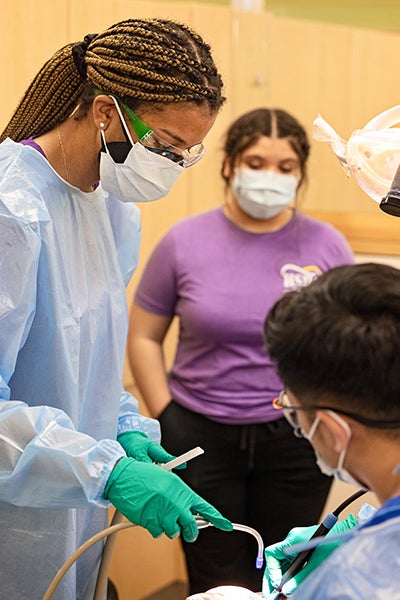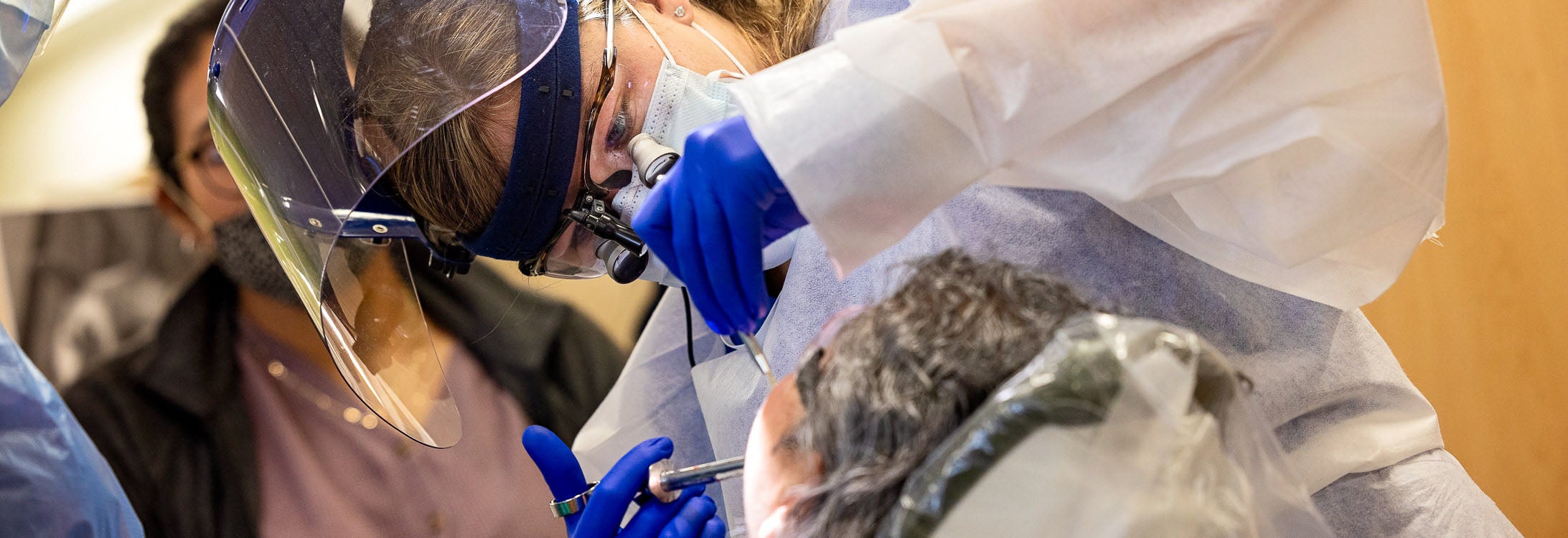SONRÍE MEANS SMILE
ECU dental school provides oral health care to migrant farmworkers
Elena Uzun sat transfixed by the developing conflict in Ukraine into the wee hours of Saturday, Feb. 26. But when dawn arrived, she headed to the East Carolina University School of Dental Medicine to be a part of the school’s second annual Sonríe Clinic that provided oral health care to about 25 migrant farmworkers in eastern North Carolina.
Uzun, a native of Moldova and a patient care representative for the school, was concerned for the safety of family members as Russia advanced on Kyiv, Ukraine — and found it even more vital to help register and check patients in as they arrived at the Sonríe Clinic.
Close to 80 volunteers — dental school students, residents, faculty, staff and community members — lent their skills, expertise and compassion to the event, a partnership with the Association of Mexicans in North Carolina, Inc. (AMEXCAN).
The event was created by students in the dental school’s Hispanic Student Dental Association (HSDA) as part of a mission-driven effort to reach out to communities without direct access to care.
“I’m helping with patient registration and trying to make the process as smooth as possible, as easy as possible for providers to access the charts and have everything available by the time the patient gets in the chair,” Uzun said. “Coming from the poorest country in Europe, I understand the importance of oral health and dental care, and having the opportunity to serve alongside faculty members, coworkers and students to help the Hispanic underserved community to deliver this help is a great honor.”
Planning for last year’s inaugural Sonríe Clinic began in 2019 after representatives from the Greenville-based, not-for-profit Access East approached ECU’s HSDA chapter to discuss ways to bridge the Hispanic community with access to care. Now, the Sonríe Clinic is officially a tradition that was born from the desire of ECU dental students who wanted to take action to bridge the care gap for migrant farmworkers. And in only its second year, the event nearly doubled in size and service from the inaugural event.

Volunteers from the ECU School of Dental Medicine provide care during the Sonríe Clinic as an interpreter looks on.
“Right now, I’m in clinic, and I have experienced a variety of patients,” said Raul Garcia, co-president of the HSDA and one of the Sonríe Clinic organizers. “Overall, my classmates have always been very open-minded and have open arms to help one another. The mission of ECU is to serve the underserved, no matter your color, your race or sexual orientation. Overall, that has been our main goal.”
Garcia said the clinic has been a learning experience that culminated in even more smiles than last year — a tangible reaction to what it’s all about, as well as a rewarding result of the work that HSDA, nearly 30 members strong this year, put into the event.
“Even before dental school, my goal was to help my community,” he said. “We’re very happy to be able to have this event. It’s been a lot of hours of thinking, programming and planning.”
Dr. Acela Martinez Luna, clinical assistant professor and division director of implantology for the dental school, serves as a faculty advisor for HSDA and said the event was the result of students actively offering a solution to a problem they noticed.
“I’m proud to say that my students are aligned with the mission of serving the underserved,” she said. “The HSDA worked really hard to build this event, and we thank everyone who volunteered or made a donation.”
Martinez Luna said the event is one way the school can make the Hispanic community aware of resources available to them and provide those services on a weekend, when many are off work.
“This helps make them aware that we have a dental school that they can come to,” she said. “Sometimes it’s hard for Hispanic patients to find dental care. Sometimes they don’t know where to go or how to become a patient or get things started.”
Each patient who received care during Sonríe Clinic had an interpreter on hand to explain each step of the procedure and to help translate information between patient and provider.
“They are very appreciative,” said Dr. Alex Gillone, clinical assistant professor, division director of periodontology and faculty advisor for HSDA, adding that have translators and providers who can speak to them in Spanish makes a world of difference as well.
“When I talk in Spanish to them, I can really see from looking in their eyes how happy they are, almost surprised,” he said, that someone is speaking their native language to them in a clinical setting.
Gillone said this year’s clinic helped highlight the spirit of the school, whose volunteers chose to help provide care on a weekend.
“It’s always just a great experience to fulfill the mission of the school,” he said. “I cannot express how amazing it is to be a part of it.”
Taylor Harris, third-year dental student and treasurer of HSDA, said part of what drew her to the dental school was its focus on creating and offering events like the Sonríe Clinic.
“The past two years, this event has taught me that no matter where I am in my professional career, I can make a difference,” she said. “As a student, an assistant, a dental provider or simply a smiling face, the people we have served have been grateful for each and every person involved. That’s what is so important to me. Making a difference that may seem so small to me — but could be life changing to someone else.”
